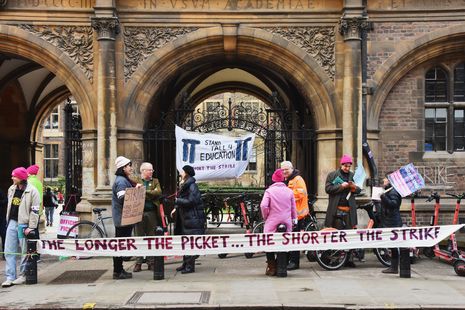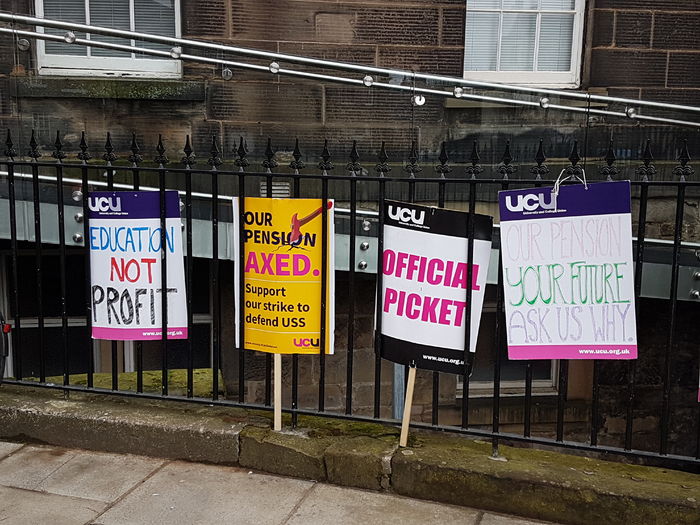Strikes are disruptive, but higher education needs disrupting
In response to a recent article, Matthew Lloyd Roberts defends the ongoing strikes and dissects the current aims of the strikes

I woke up on the morning of Storm Eunice after a week on the picket line and read a Varsity opinion piece addressing the strikes. As a first-year PhD student, reading this piece hurt. I had spent that week standing outside in the cold and wet, with fellow PhD students, administrative staff, junior academics; people that I admire and respect who just wanted the university to treat them fairly. This piece argued that they were duplicitous, misrepresenting their position, and not acting in the interests of the community here in Cambridge. I wanted to address some of the arguments made in that piece and explain why I disagree with them.
The piece is flawed from its very start when it suggests that cuts to USS pensions ‘aim to reduce the risk of the scheme running out of money in the future.’ This is an argument that almost everyone, even Cambridge University, disagrees with, as the USS reform is based on a projection of the valuation of the pension fund from March 2020, when the peak of pandemic insecurity led to the most pessimistic possible estimates. Since then, the valuation of the scheme has climbed from £66.5 billion to £89.3 billion, and there is general agreement that these cuts are not evidence-based. Cuts to a large pension scheme like USS will be used to justify further erosion of pension benefits for everyone across the economy.
“The reality is that many in the sector are facing enormous hardships”
Having argued, incorrectly, that the USS pension cuts are justifiable, Jones goes on to suggest that the union had deliberately misrepresented the strike action, by foregrounding the suffering of precarious supervisors as rhetorical cover for a less worthy fight about pension reform. Nobody who spent any time around strikers that week could possibly agree with this. All the leaflets handed out by picketers addressed pension reform. The most common chant I heard all week was “Hey Hey, Ho Ho / Pension cuts have got to go”. My most effective line to passers-by was “they’re cutting lecturer’s pensions by 35%”. Indeed, many people intuitively understand that these kinds of cuts, contrary to being a snub to rich academics, actually make jobs in higher education less accessible to those from working-class backgrounds.
This suggestion that UCU is misrepresenting this action makes way for the most virulent claims of the piece, that UCU strikes are engaging in an ‘embarrassing cos-play’, where senior academics, only interested in self-enrichment, falsely borrow the language of class struggle. In some ways, I wish that the piece was right, that the picket lines were packed with senior academics showing their unhappiness with the myriad injustices in the way the university is currently managed, but sadly that is overwhelmingly not the case, and mostly I spent my time on the pickets with people fully expecting to be forced out of higher education by cost-of-living increases.
“If you asked me to design a university administration that would foment union support, I would struggle to do as well as the University of Cambridge has managed”
This angle is part of a broader attempt to undermine the legitimacy of strike action in the higher education sector. Tropes that favourably compare university conditions to ‘Victorian workhouses’ and ‘mineshafts’ are tired attempts to devalue the labour of university staff, including PhD students who supervise. The reality is that many in the sector are facing enormous hardships: forced to work as many as 5 part-time roles to afford to live; stuck in freelance work or 12-week rolling contracts with no security to plan for the future. When people do have contracts, they are implicitly expected to work far beyond their contracted hours. The university has willingly allowed its employees to reach a level of precarity in which they can’t afford rent. It is all very well and good to say: ‘None of this is to deny that there is a real problem with supervisors’ pay’, but management freely allows these injustices to continue. How do we make the university treat its staff more fairly?
The opaque, casualised system of teaching administration, and the ad hoc provision of this world-class education is maintained because it suits the interests of the university and colleges. Cambridge is the only public university in the country that refuses to recognise UCU. PhD students who are UCU members are unable to strike from teaching supervisions because the union represents workers in negotiations about their work for the university, but not for colleges. Meanwhile, the pickets are awash with stories of young workers deprived at the last minute of income they were relying upon, of invoices paid over a year late, squeezed living standards, 80-hour weeks and people leaving the sector from exhaustion. If you put me in a lab and asked me to design a university administration that would foment union support, I would struggle to do as well as the University of Cambridge has managed.
In the piece, Jones protests that Stephen Toope doesn’t have a ‘magic button to end inequality’. But Toope’s salary, £370,000 for 2019/20, and understood to be significantly higher now, is a product of huge inflation amongst senior management across the sector over the last decade and coincided with a real-terms pay cut of 20% for academic staff. Even Tory MPs are on TV conceding that universities have sufficient funds to pay their staff a decent wage, and yet the cuts continue.
The decline in conditions of employment in universities reflects a broader trend across the job market: towards precarity, declining wages and rising inequality. A significant driver of this process has been the decline of trade union membership in Western economies over the last 40 years, as a result of ideological attacks on unions. The 2010s were the worst decade for real-terms wage growth in the UK since the 1830s, and now inflation is above 7%. Strong unions, capable of meaningful strike action have been one of the most successful historical tools for redressing inequality. I want to see a more equitable university, and for that reason, I’ll be back on the picket line, Monday 28th February to Wednesday 2nd March.
 News / Cambridge study finds students learn better with notes than AI13 December 2025
News / Cambridge study finds students learn better with notes than AI13 December 2025 News / Cambridge Vet School gets lifeline year to stay accredited28 November 2025
News / Cambridge Vet School gets lifeline year to stay accredited28 November 2025 Science / Did your ex trip on King’s Parade? The science behind the ‘ick’12 December 2025
Science / Did your ex trip on King’s Parade? The science behind the ‘ick’12 December 2025 News / Uni Scout and Guide Club affirms trans inclusion 12 December 2025
News / Uni Scout and Guide Club affirms trans inclusion 12 December 2025 Arts / Modern Modernist Centenary: T. S. Eliot13 December 2025
Arts / Modern Modernist Centenary: T. S. Eliot13 December 2025








